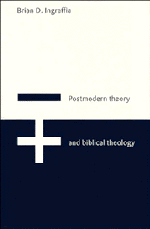Book contents
- Frontmatter
- Contents
- Acknowledgements
- List of abbreviations
- Note on translations of the Bible
- Introduction: postmodernism, ontotheology, and Christianity
- 1 NIETZSCHE'S MOCKERY: THE REJECTION OF TRANSCENDENCE
- II HEIDEGGER'S FORGETTING: THE SECULARIZATION OF BIBLICAL ANTHROPOLOGY
- III DERRIDA'S DENIALS: THE DECONSTRUCTION OF ONTOTHEOLOGY
- 11 From the ends of man to the beginnings of writing
- 12 Deconstituting the subject
- 13 Writing and metaphysics
- 14 Reading the law: the Spirit and the letter
- 15 Scripture or écriture: the limitations of Derrida's deconstruction of ontotheology
- Conclusion: ontotheology, negative theology, and the theology of the cross
- Notes
- Bibliography
- Index
14 - Reading the law: the Spirit and the letter
Published online by Cambridge University Press: 01 June 2011
- Frontmatter
- Contents
- Acknowledgements
- List of abbreviations
- Note on translations of the Bible
- Introduction: postmodernism, ontotheology, and Christianity
- 1 NIETZSCHE'S MOCKERY: THE REJECTION OF TRANSCENDENCE
- II HEIDEGGER'S FORGETTING: THE SECULARIZATION OF BIBLICAL ANTHROPOLOGY
- III DERRIDA'S DENIALS: THE DECONSTRUCTION OF ONTOTHEOLOGY
- 11 From the ends of man to the beginnings of writing
- 12 Deconstituting the subject
- 13 Writing and metaphysics
- 14 Reading the law: the Spirit and the letter
- 15 Scripture or écriture: the limitations of Derrida's deconstruction of ontotheology
- Conclusion: ontotheology, negative theology, and the theology of the cross
- Notes
- Bibliography
- Index
Summary
[T]he letter kills, but the Spirit gives life.
Paul, 2 Corinthians 3:6[H]ow could Hebraism belittle the letter…?
Derrida, “Violence and Metaphysics”In defending Paul against the Derridean deconstruction presented in Of Grammatology, I will also be defending the Bible's claim to be a distinctive revelation, different from the ontotheology deconstructed by Heidegger and Derrida. I will attempt in this chapter to distinguish the biblical opposition between the letter and Spirit from the metaphysical distinction between the sensible signifier and the ideal signified. In order to do this, we must also look both back to the Greek, Platonic conception of the opposition between the writing of divine laws on the heart and the writing of man's laws on stone or paper, and forward towards the appropriation of the Pauline distinction between letter and spirit in the metaphysical tradition, to the amalgamation of the Greek and biblical concepts in medieval and modern ontotheology.
The first distinction to be made is between Paul's opposition between letter and Spirit and the reading of this opposition by the idealist tradition (both in metaphysics and theology). That idealism is a central target in Derrida's deconstruction of the tradition is made clear in Derrida's interview with Houdebine and Scarpetta: “Logocentrism is also, fundamentally, an idealism. It is the matrix of idealism. Idealism is its most direct representative, the most constantly dominant force. And the dismantling of logocentrism is simultaneously – a fortiori – a deconstitution of idealism or spiritualism in all their variants” (Pos 51).
- Type
- Chapter
- Information
- Postmodern Theory and Biblical TheologyVanquishing God's Shadow, pp. 195 - 212Publisher: Cambridge University PressPrint publication year: 1995



